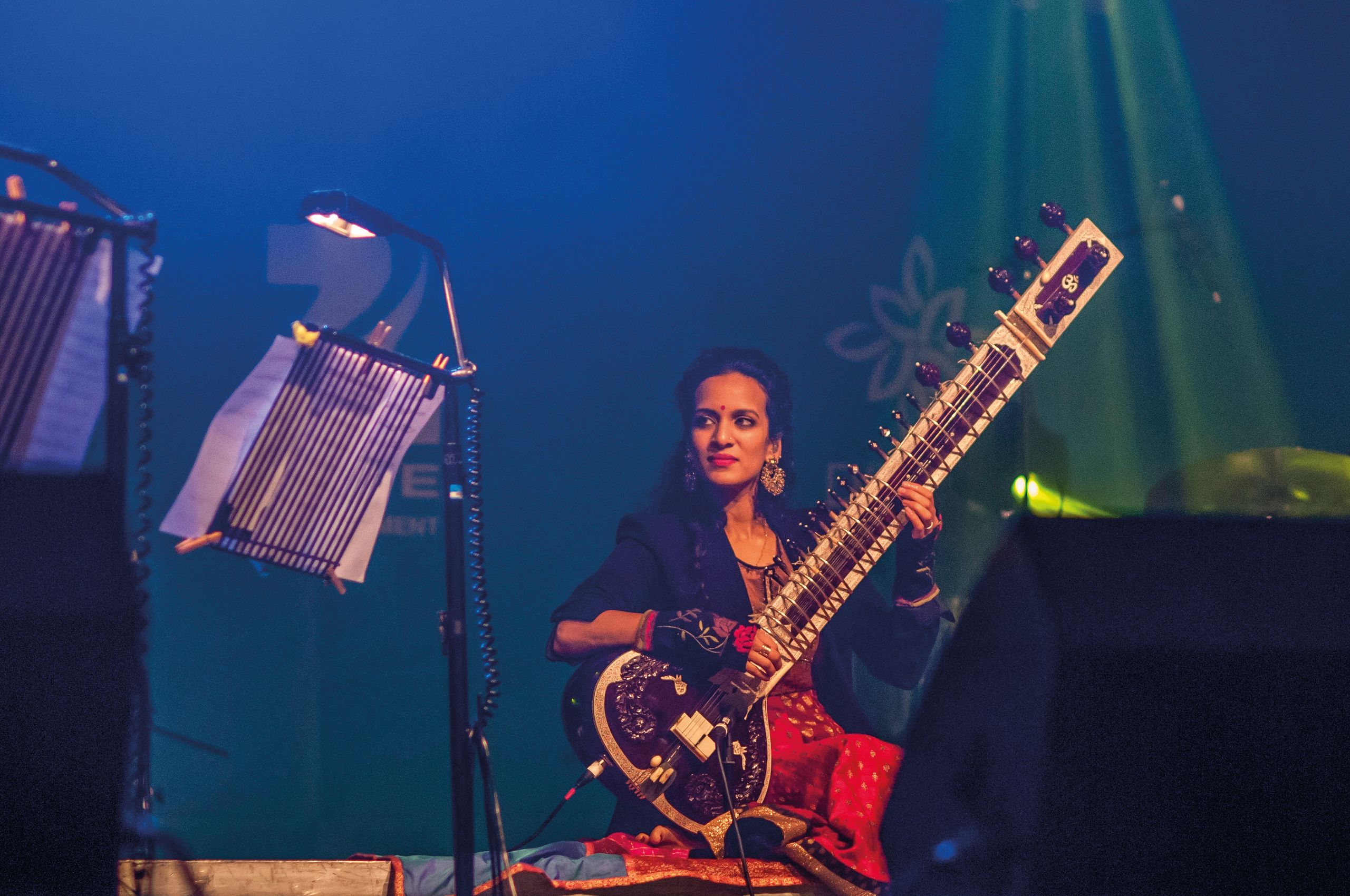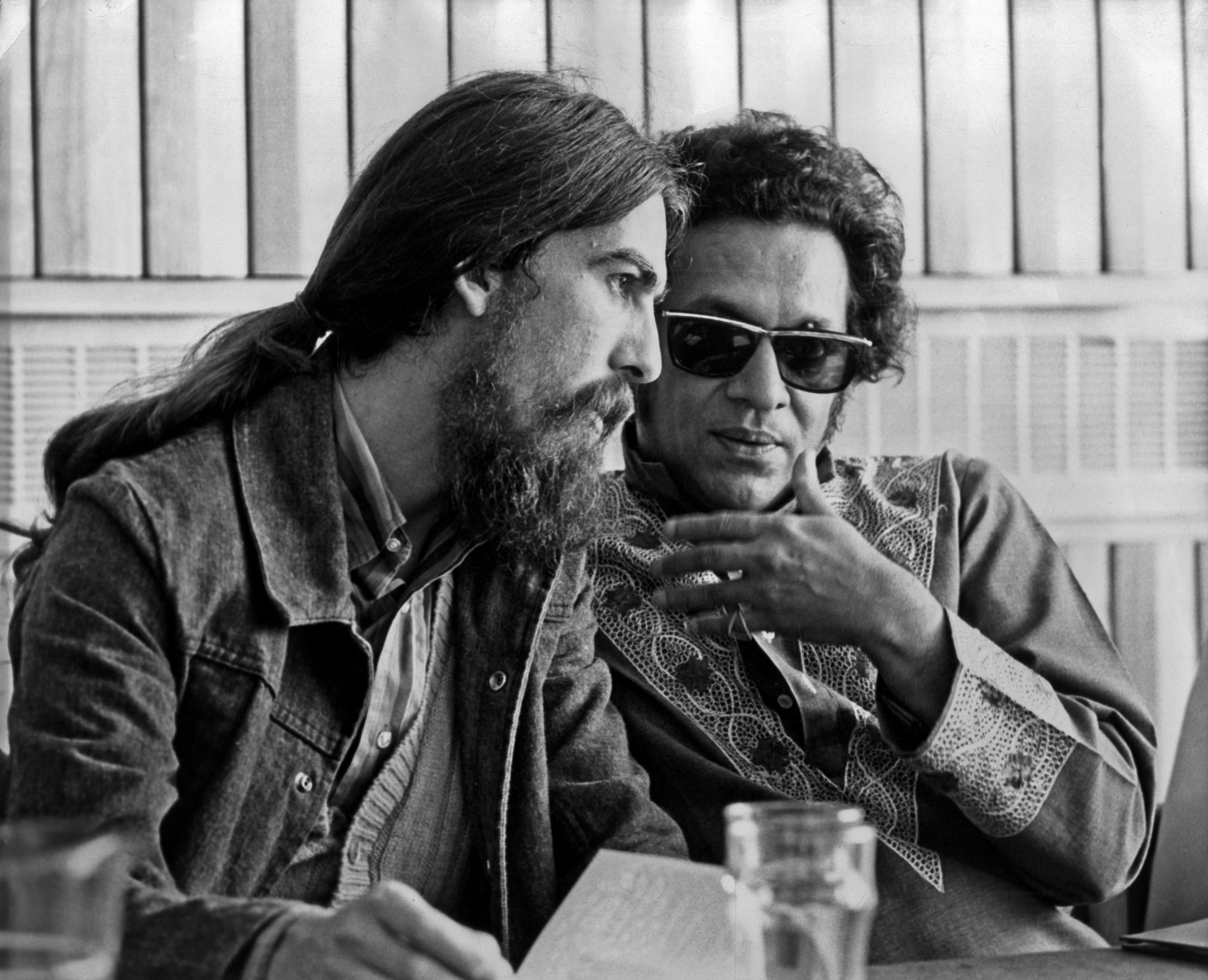An Explorer by Instinct
Sitar player Anoushka Shankar inherited a great tradition of Indian classical music from her famous father, Ravi, born 100 years ago – but she has also forged her own path. She talks to Oliver Craske about the new collaborations at the Proms that develop her ever-expanding musical horizons

There has long been the sense of a journey unfolding in Anoushka Shankar’s music. It is there in her transition from hereditary prodigy of Indian classical music to the genre-defying position she occupies today, as she shuttles between the classical and contemporary scenes, between acoustic and electronic sounds, between solo and ensemble work. It is even spelt out in some of her album titles: from Rise (2005) through Traveller (2011) to Home (2015) and Land of Gold (2016). Resisting expectations, adapting to the challenges that life throws her, she is guided by an instinct for exploration.
At the Proms three years ago she gave the memorable first live performance of Passages, the album that her late father and guru, the sitar maestro Ravi Shankar, composed with Philip Glass in 1990. This year she returns with a Prom that explores two musical worlds – in the first part she collaborates with the British electronic music composer/performer Gold Panda, and in the second she performs arrangements of her own works with percussionist Manu Delago and the Britten Sinfonia, conducted by Jules Buckley.
The approach in the first part is to create new pieces incorporating Anoushka’s sitar improvisations, live electronics by Gold Panda and (in parts) some samples or rearrangements of her father’s recordings. We will hear, for example, Ravi’s own voice explaining what a raga is, while Anoushka explores raga Yaman Kalyan on sitar, segueing into a passage from the third movement of his Sitar Concerto No. 2 – but performed by sitar and electronics alone, rather than with a symphony orchestra. She and Gold Panda both relish how their collaboration bridges the acoustic–digital divide. ‘I love the combination of fresh sound-world and authentic raga representation,’ she says. ‘I hope it helps to present ragas and the sitar in a new light.’
She began working with Buckley three years ago, when he first arranged a selection of her pieces, and most recently they undertook a short tour together with the Netherlands-based Metropole Orkest in 2018. For their Prom this year they have created new chamber-orchestra arrangements for the Britten Sinfonia. Anoushka enjoys this process of collaboration too. Buckley writes the orchestrations before they refine details together; she takes particular care to notate Indian rhythmic patterns correctly. There will also be an arrangement of a composition by Delago, a longtime collaborator and co-writer of Anoushka; he will play throughout the second part on the hang (handpan) and a drum kit.
Anoushka’s musical restlessness was inherited from her father, Ravi Shankar. Growing up between India, Europe and America, she began learning sitar from him aged 7, and at 13 made a high-profile debut in Delhi. For years she toured with Ravi, assisting on sitar and continuing her apprenticeship. Where music was concerned, he remained a restless firefly to the end, addicted to the stage and always seeking new vistas. Anoushka has done things differently, learning to temper her own wanderlust, and valuing rest and a sense of home, while remaining prolific. Her music has evolved in different directions. She is equally impressive playing classical ragas with tabla accompaniment, soloing with the world’s leading orchestras or using a pedalboard to loop live sitar sounds over electronics, as she will do in the first half of the Prom.

The East-meets-West quest: Ravi Shankar (right) in September 1970 with former Beatle George Harrison; after The Beatles split up, the two musicians collaborated on three studio albums (Bridgeman Images)
The East-meets-West quest: Ravi Shankar (right) in September 1970 with former Beatle George Harrison; after The Beatles split up, the two musicians collaborated on three studio albums (Bridgeman Images)
In venturing into Western orchestral arrangements, she echoes her father’s path. His pioneering compositions included three sitar concertos, a symphony, an opera and film scores, as well as many other ensemble pieces. Anoushka was just 15 when she performed Ravi’s Sitar Concerto No. 1 with the London Symphony Orchestra, and later played the same work during her Proms debut in 2005. He wrote the sitar parts in his Symphony and Sitar Concerto No. 3 for her, and also initiated her into conducting Indian and Western ensembles. ‘I’ve had a lot of experience working with orchestras and it’s something I really love,’ she says. ‘But this is the first step into playing with an orchestra when it’s my music. It does feel thrilling. The next ambition would be writing for orchestra myself.’
However, her approach to collaboration diverges from that of her father. He was famous for working with the likes of Glass, Yehudi Menuhin and George Harrison, but he always insisted on collaborating within the structures of ragas and talas (Indian melody forms and rhythmic patterns). ‘I think there’s a difference, with him being a sort of messianic figure sharing his music with the world – and in collaboration he was also bringing his music to the world, and teaching – whereas I didn’t so much move from one world into another,’ she says. ‘I grew up simultaneously in these multiple worlds.’
For her, collaboration is a means of enabling dialogue between musical forms. ‘I’ve really enjoyed stepping out of my comfort zone,’ she says. She mentions her album Traveller, on which she explored the links between flamenco and Indian music. ‘It was a great example of taking my sitar and going to Spain and trying to figure out rhythms and patterns. I learnt so much as a result. But it was a two-way street: I was there also explaining Indian rhythmic patterns and ragas. So the music will sit anywhere along the line between Indian classical and whatever else I am working with.’ The same flexibility applies to her repertoire at the Proms: some of the Britten Sinfonia orchestrations remain strictly within the rules of a raga (such as raga Kirwani for ‘Voice of the Moon’), while in others she and Buckley choose to apply a less rigid harmonic treatment.
Anoushka Shankar shuttles between the classical and contemporary scenes, between acoustic and electronic sounds, between solo and ensemble work … Resisting expectations, adapting to the challenges that life throws her, she is guided by an instinct for exploration.
Bold as ever, Anoushka has in recent years been vocal in her support for women’s rights and social justice, especially the suffering refugees of the 2015 migration crisis who inspired Land of Gold. She has not been afraid to show her vulnerability, either, in the songs on her EP Love Letters, released this year. For the first time, she has even sung on record herself, having previously worked with stellar female vocalists such as Shubha Mudgal, M.I.A. and her own half-sister, Norah Jones.
Parenthood – her sons are now 9 and 5 – has provided a new perspective on music. ‘I have really enjoyed having a broad eye as far as what I turn to – and, if anything, that’s come from just lightening up a little. I don’t think too heavily about what kind of style I’m working in,’ she says. In those recent songs she employed a more stripped-down approach to composition, building a piece from a simple motif. Not that all her writing has been straightforward in nature. Shiraz, a 1928 Indian movie for which the British Film Institute commissioned a new score from her in 2017, required her to compose two hours of ensemble music and play it live, synchronised to the film. ‘But, even there, I stopped thinking so heavily about how one would define the music,’ she explains.
As she forges her own path, she remains conscious of her debt to her extraordinary and much-missed father. To celebrate the centenary of his birth this year, she and Norah planned many global events that have had to be rescheduled owing to the pandemic, so Anoushka is happy that this Prom offers a chance to honour him now. As she pays overt tribute to him in her own imaginative way, she now seems at ease with her own musical identity and wherever it takes her next.
Oliver Craske is the author of ‘Indian Sun: The Life and Music of Ravi Shankar’ – the first full biography of his subject – published this year (Faber & Faber). He has known Anoushka Shankar for 25 years.
This is a revised version of an article originally written for the BBC Proms 2020 Festival Guide, which was not published this year owing to the change of programme following the coronavirus epidemic.
Produced by BBC Proms Publications